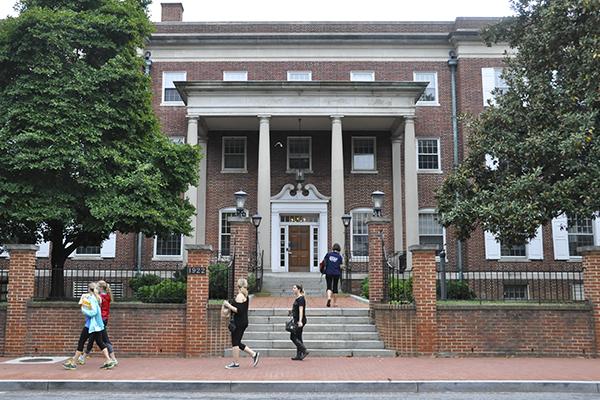Some international students will get a little extra help with their English as part of a new program.
GW launched the English Language Institute this summer, a six week-long crash course in the English language for graduate students. Through the pilot program, students are conditionally accepted to GW, as long as they receive a passing grade in two three-credit classes.
Maralee Csellar, a University spokeswoman, said in an email that all 11 students who enrolled in the program completed it and are now graduate students.
Csellar said the program was created to strengthen the English language skills of international students who were deemed academically qualified to attend GW but who “need to enhance their English language skills prior to formal admission.”
The University’s English for Academic Purposes program developed the curriculum, which includes listening, speaking, reading and writing. The classes, she said, focus on “socializing” international students into the American academic community.
The University aims to double its international student population body by 2020, a core component of the strategic plan. The number of graduate students studying at GW with academic visas has increased by at least 40 percent since 2008.
Csellar also said “efforts are underway” to increase the size of the program in future years, which she said will be called the Applied English Language program. She said developers of the program will collaborate with schools to “develop co-curricular activities.”
Cara Fulton, a lecturer in the English for Academic Purposes program — an existing series of courses with the same goals of the English Language Institute — taught 10 of the graduate students this summer. She said in an email that because the students have already earned their bachelor’s degree, they “know how to study” and were “perhaps more highly motivated than younger students.”
Fulton, who specializes in helping non-native English speakers develop American accents, said the program could be improved with more diversity. Most of her students were from China, as well as Saudi Arabia, India and Taiwan. She said she would “like to see students from Latin America, Africa, Europe and other Asian nations.”
She added that the program could be improved by having international students live with English-speaking natives in residence halls.
“The students would have benefited by rooming with native speakers in the dorms, but instead they were assigned rooms with each other. [They] need to learn much of the informal language used every day on campuses and in the classroom,” she said. “The best place for them to get that is from their peers.”
Eddie West, the director of international initiatives at the National Association for College Admission Counseling, said that despite the nationwide push for American college students to study abroad, those who could afford to travel and still graduate on time would always be the minority. The next-best scenario would be increasing the number of international students on campuses, he said.
“Enlightened campus officials understand that the next best thing to study abroad is having international students come to campus,” he said.
After the international students are admitted to GW’s program, West said it’s critical that the University follows up with them to see how they are handling their course work.
He said students who are prematurely admitted to the University without the capacity to communicate in English could spend more time than they should on homework and could find it difficult to understand lectures, which would be problematic if their grades depend on class participation.
Because faculty interact the most with students, West said they should be especially aware of the issues international students face and keep tabs on those students’ progress in the classroom and with English.
“The first people to alert administrators are the faculty,” he said. “They’re typically not going to stand for it if they have students who are ill-prepared.”








